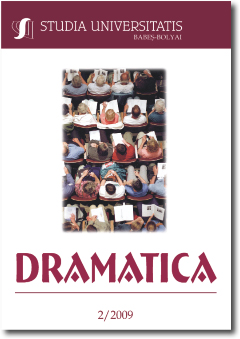BEATING THE HELL OUT OF SADO-MASOCHISM? TOWARDS A CINEMA OF THE OPPRESSED THROUGH MICHAEL HANEKE’S FUNNY GAMES
BEATING THE HELL OUT OF SADO-MASOCHISM? TOWARDS A CINEMA OF THE OPPRESSED THROUGH MICHAEL HANEKE’S FUNNY GAMES
Author(s): Mihai GădăleanSubject(s): Theatre, Dance, Performing Arts
Published by: Studia Universitatis Babes-Bolyai
Keywords: theatre of the oppressed; sado-masochistic dynamic; spectatorship.
Summary/Abstract: Transylvania may be an extreme place. Maybe that’s why Cluj-Napoca annually hosts an International Film Festival that brings into the attention of the public many (and I mean many!) films that may be considered extreme – or at least provocative, in one way or another. For example, one year, there was a „focus” section dedicated to Haneke. Another, it was Roy Andersson. In 2007, the festival opened with Cristian Mungiu’s „4 luni, 3 săptămîni si 2 zile” („4 weeks, 3 months and 2 days”). Last year, it was again Haneke’s turn. His „Funny Games (U.S.)”, projected as the first movie of the Transylvania International Film Festival (TIFF), had such an effect that many viewers, from the biggest movie buffs to plain curious „tourists”, refused to watch it and left the Republica theatre before the movie was over. So, while Transylvania may indeed be a place of extremes, its inhabitants seem to be quite balanced people. But is it really a question of balance with Haneke’s viewers and non-viewers? What seems to have bothered most of the latter is the directors’ apparent superiority in his „relationship” to them. Some friends of mine, really passionate about cinema and cinema studies, that have left the theatre then have later said that Haneke is a fraud and they couldn’t stand to be taken for fools any longer. They were particularly intrigued (and discontent) with the Brechtian „fourth-wallbreaking” of the lead character in „Funny Games U.S.” (and „Funny Games”, for that matter). More or less exactly, their reaction can be summed as: „Not only did Michael Haneke make abuse of violence, now he makes the criminal mind speak to me? Speak directly to me?” What Michael Haneke might reply to the revolted spectators is the classical annoying cliche line: „I was only trying to help!” Indeed, he might have a point. But does his method really succeed?
Journal: Studia Universitatis Babes-Bolyai - Dramatica
- Issue Year: 2009
- Issue No: 2
- Page Range: 21-26
- Page Count: 6
- Language: English

